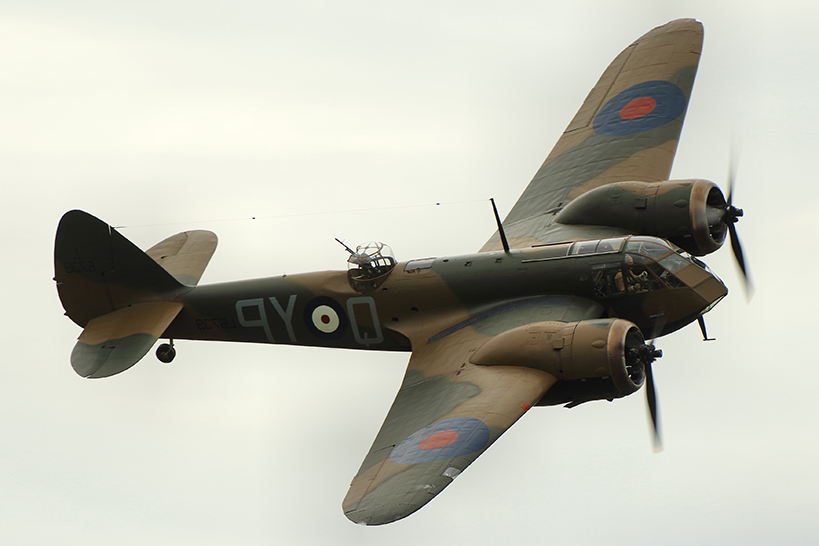David, William Dennis
- Date of birth:
- July 25th, 1918 (Surbiton/Surrey, Great Britain)
- Date of death:
- August 25th, 2000
- Nationality:
- British
Biography
Service number 40805.
David grew up at Tongwynlais in the Taff Valley north of Cardiff and started his working life in a wholesale clothing business, run by an uncle in London. He also studied at night school and in May 1937 was accepted at one of the new Reserve Flying Schools, at Hanworth.
After qualifying in 1938 for a short service commission in the Royal Air Force Volunteer Reserve, David was posted in 1939 to No 87 Squadron, which was exchanging Gloster Gladiator biplanes for Hurricane fighters. When war broke out, 87 Squadron was sent to France, one of only four Hurricane squadrons in the air component of the BEF.
David was in action from the opening hours of the German invasion and shot down 11 German planes in May 1940. On his return to England he went to bed and slept for 36 hours
David continued to fly during the Battle of Britain, for which 87 Squadron was moved to Exeter. David kept adding victiories to his list. In October, he was posted as a flight commander to 213 Squadron, another Hurricane squadron, also based at Exeter. David's final kill was on October 19 when he shot down a Ju88 to bring his score to 20. In November he was posted to No 152, a Spitfire squadron.
Thereafter he spent two years training pilots, many of whom were Poles, Free French, Norwegians, Dutch, Belgians and Americans who had joined the RAF.
In 1943 he was sent to the Western Desert to command 89 Squadron, equipped with night-fighting Beaufighters. He was then ordered to take the squadron to Ceylon.
In 1944 he was promoted to group captain and posted to the Burma theatre. There, in the early days of 1945, a colossal air and naval bombardment was being prepared as the precursor of a full-scale attack on Akyab Island, which was known to be occupied by three Japanese battalions. In a final reconnaissance before this attack was launched David and an artillery spotting officer flew over Akyab and noticed a complete absence of Japanese aircraft on the airfield there.
David and the artillery officer promptly landed at Akyab, where the headman told them that the Japanese had gone. Thus the assault was called off. David and the officer had, effectively, "captured" Akyab themselves.
David remained in the Far East after the war, and was in charge of Allied air operations in Java. It was a difficult time. The Japanese had demonstrated to the indigenous populations of the region how vulnerable their European colonial rulers were. Java was seething with Indonesian nationalists, some of perpetrated savage acts, especially against Dutch women and children. Ironically, David, like Mountbatten elsewhere, found himself relying on Japanese officers and their troops to maintain order and evacuate Dutch civilians.
Back in Britain he was posted to command RAF White Waltham in Berkshire, but returned to the desert in 1948 to command El Adem, a major staging post. Later he was assigned to plan the training of crews for the V-Bombers: the Valiant, Vulcan and Victor. While doing this, he was also asked to act as aide to the blind but otherwise formidable Lord Trenchard, the father of the RAF. Halfway through this posting he was surprised to be asked whether he would like to go as air attaché to Hungary. While he was there, the political situation deteriorated, and in October 1956 erupted into open revolt.
Subsequent postings included the command of RAF Tangmere, from where he had flown during the Battle of Britain, and Chief of Air Plans at Naples.
He left the RAF in May 1967, intending to settle down restoring antique china and furniture, but was soon asked to become the expert adviser to the films The Battle of Britain and the First World War epic Aces High.
Do you have more information about this person? Inform us!
- Period:
- Second World War (1939-1945)
- Rank:
- Pilot Officer
- Awarded on:
- May 31st, 1940
"This officer has recently shot down four enemy aircraft and shown gallantry and devotion to duty compatible with the highest traditions of the service. His coolness and determination have been a very fine example to the other pilots of the squadron. He was involved in an engagement when six other aircraft of the squadron attacked over forty German aircraft in an attempt to protect Blenheim aircraft. He supported his leader with great courage and determination, shooting down two enemy aircraft."
- Period:
- Second World War (1939-1945)
- Rank:
- Pilot Officer
- Awarded on:
- June 4th, 1940
"This officer continued to display a fine offensive spirit and during the past few days he has shot down three more enemy aircraft, making a total of eleven in all."
Second DFC awarded as a bar for on the ribbon of the first DFC.
- Period:
- Second World War (1939-1945)
- Rank:
- Acting Wing Commander
- Awarded on:
- June 11th, 1942
- Period:
- Second World War (1939-1945)
- Rank:
- Acting Wing Commander
- Awarded on:
- January 1st, 1943
Sources
- - SHORES, CH. & WILLIAMS, C., Aces High, Grub Street, London, 1994.
- Supplement to The London Gazette Issue 34860 published on the 28 May 1940
- The London Gazette Issue 34864 published on the 4 June 1940
- Second Supplement to The London Gazette Issue 35586 published on the 5 June 1942
- Second Supplement to The London Gazette Issue 35841 published on the 29 December 1942
- The Telegraph - Obituaries
- USAF Air University Public Portal
- 152 Hyderabad F. Squadron






